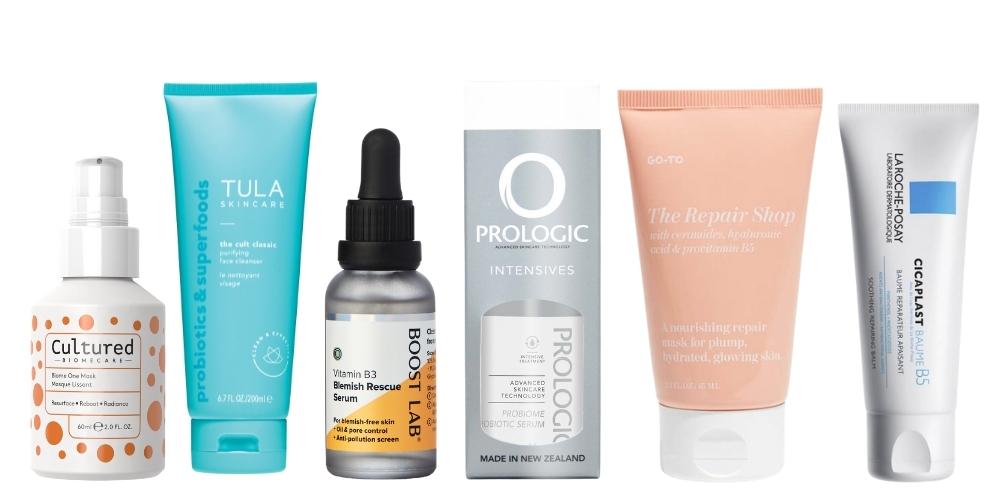After a period of ‘more is more’ in the world of skincare, according to experts we are entering an era of ‘less is more’.
With sensitivity and reactive skin now commonplace, there has been a move to embrace what has been referred to as ‘skin kindness’.
The focus for many popular brands has become less about hyping sky high-percentage formulas and aggressive use of peels and acids to constantly transform your complexion and more on anti-inflammatory solutions, nurturing the skin’s barrier, maintaining a healthy, diverse microbiome [the good bacteria that live on your skin and keep it healthy and resilient] and aligning more with self-care. In addition, minimising steps or seeking out multi-functional products for a fuss free routine, now known as ‘skinimalism’ will dominate the beauty approach.
‘Micro-dosing’, a little-and-often approach to ingredients like retinol will continue to grow as consumers recognise the benefits of key ingredients but are less inclined to leap into using the strongest products possible.
“Respect for the skin is of paramount importance,” says Dermalogica’s Emma Hobson.
“It does not take much to disturb the skin’s natural ecosystem, circulatory system, or its natural barrier protection. We see a strong movement away from endless products layered over each other. Though an advocate for layering products, it can only be with those that complement each other and that the skin needs, and never to excess.”
Managing the microbiome
This type of approach is another result of the pandemic, says MECCA Creative Director, Marita Burke.
“In my opinion it’s thanks to environmental and other external stressors, masks – and the dreaded mask-ne! – and various lockdowns we’ve all endured.“
She says there will be an increasing relevance of the microbiome in skincare, particularly via clinically effective products that contain probiotics and superfoods, intended to restore and protect the skin’s natural balance. She tips the arrival of brands Cultured and Tula at MECCA as part of the beauty megastores’ “microbiome destination”.
“In recent years we’ve witnessed a real blurring of the lines between beauty and wellness. I think we’ll see a continued focus on self-care, both in at home skincare and being kind to our bodies in other ways.”
One of a number of new releases embracing the mind-skin connection is Prologic Probiome Probiotic Serum, containing a prebiotic compound from plant stem cells of Cannabis sativa, free from THC & CBD.
“Kannabia Sense is a revolutionary new ingredient that addresses the health of the microbiome of the skin, along with having a wellbeing effect,” says Prologic’s Rachel Robertson.
“It works by stimulating cutaneous oxytocin, then sending a message to the “pleasure” part of the brain, which then drives a wellbeing response. We wanted to be able to support emotional wellbeing, addressing the skin holistically. “

Nourish and repair your skin: Cultured Biome One Mask; Tula The Cult Classic Purifying Face Cleanser; Boost Lab Blemish Rescue Serum; Prologic Probiome Probiotic Serum; Go-To The Repair Shop Nourishing Repair Mask; La Roche-Posay Cicaplast Baume B5 Repairing Balm
Soothing irritated skin
The influx of products designed to calm and soothe skin and restore its resilience can simple as moisturisers with ingredients such as ceramides which work to support the skin barrier but also includes gentle targeted options that gently treat issues like irritation and acne, as well as the aforementioned mask-ne.
“Not only do masks irritate and trap build-up in the skin where they make contact, but add heat and hot breath, and it’s the perfect environment for bacteria to flourish,” explains Pauline Dubois, Senior Formulation Chemist for Boost Lab skincare, of the particular challenge of face coverings pose to skin.
“If you have symptoms such as chafing, redness and breakouts concentrated along the chin, upper lip and jawline, then you most likely have ‘maskne’, or acne mechanica.
Increasingly products combining ingredients with anti-microbial and sebum-regulating properties help address the issues as well protect from further impact.
“Look for ingredients targeting inflammation and improving skin barrier function, ” says Dubois, suggesting the likes of Boost Lab’s Blemish Rescue Serum that uses Zinc PCA, a universal sebum regulator with anti-microbial properties.
“It is combined with Niacinamide which reduces skin imperfections triggered by inflammation and improves skin texture while reinforcing skin barrier function. ”







